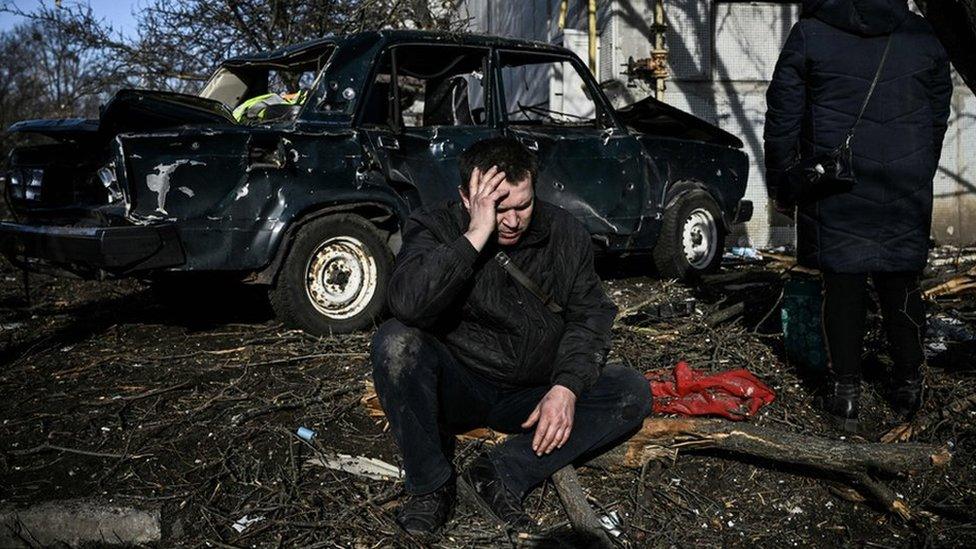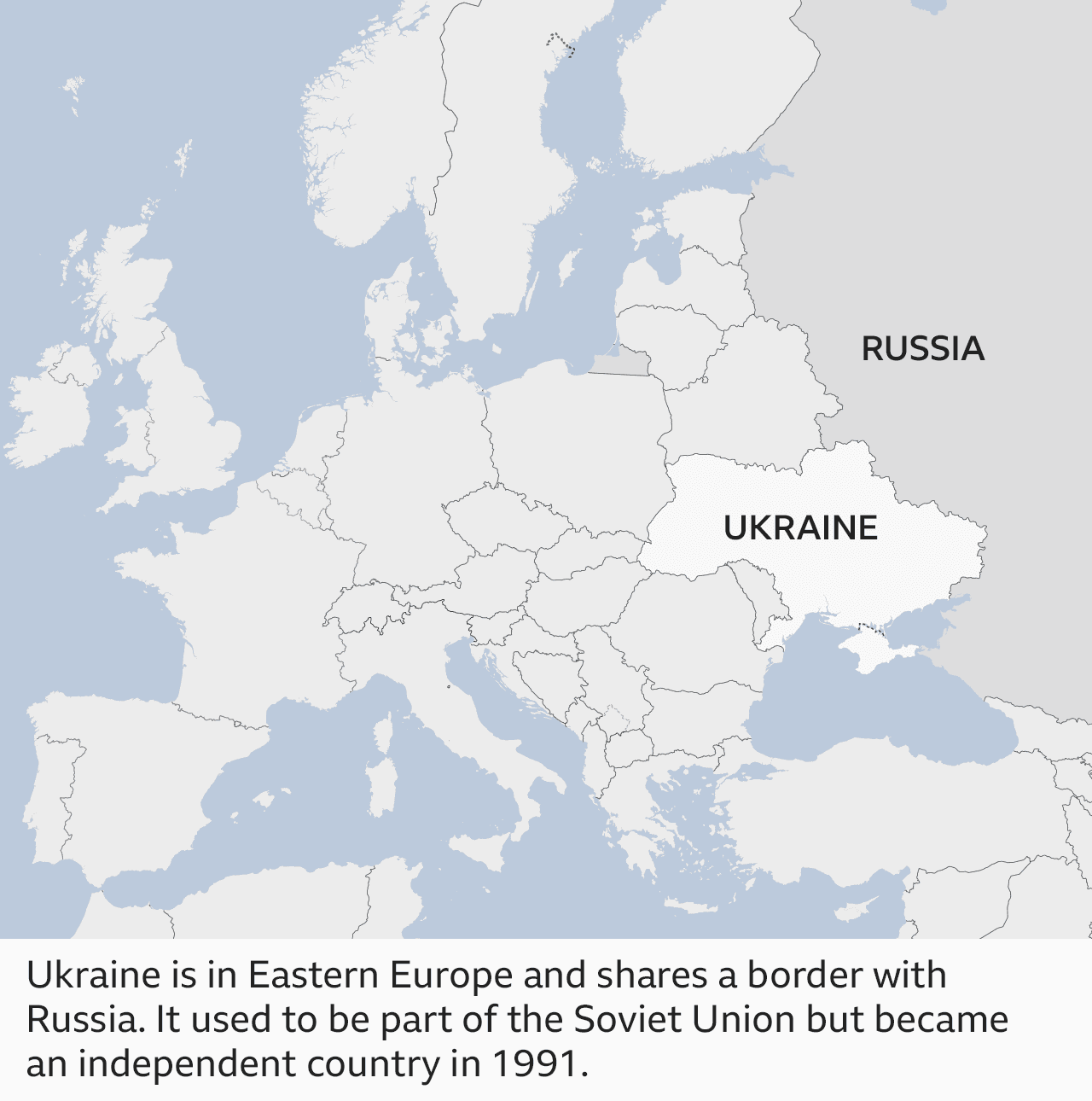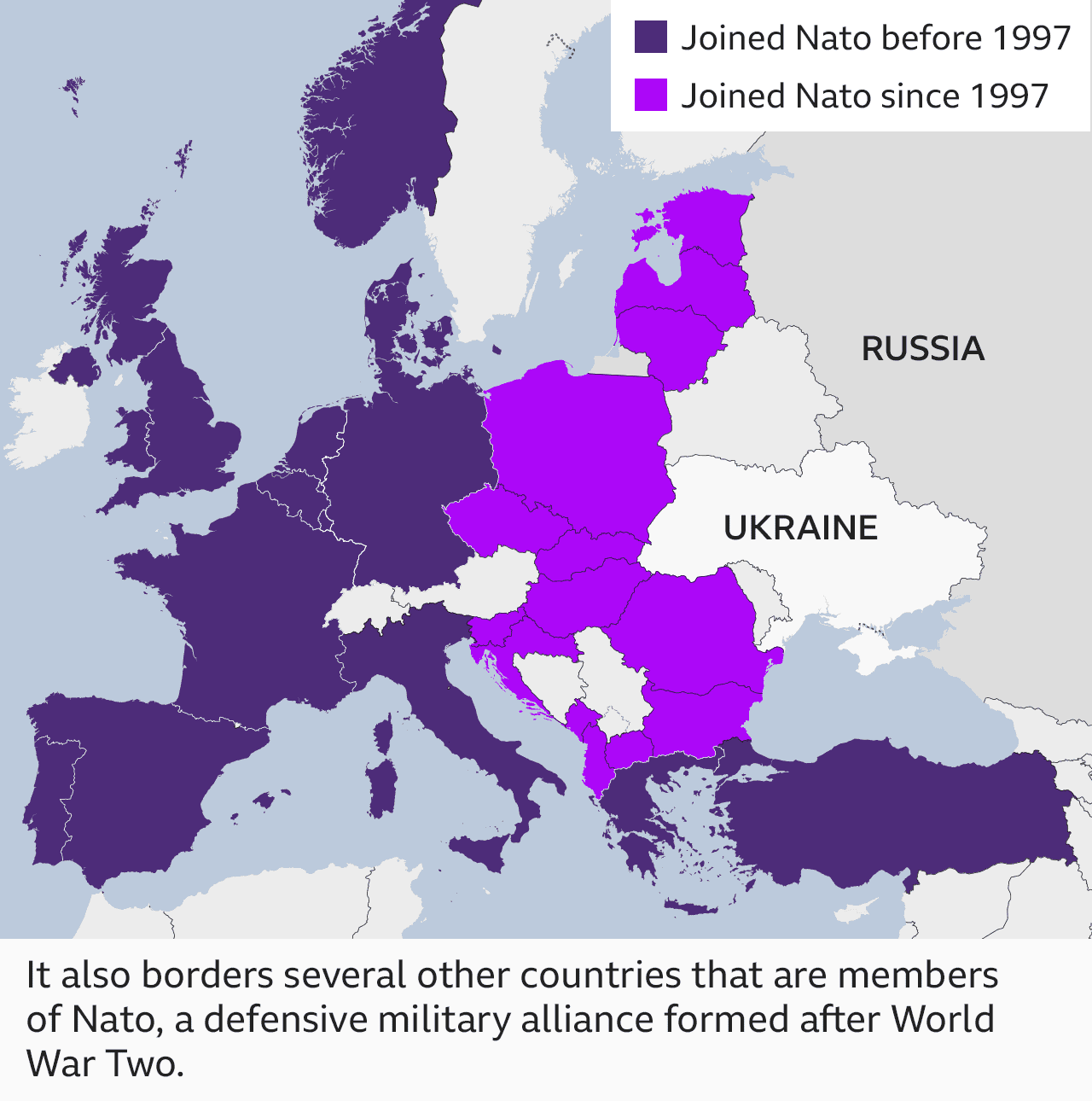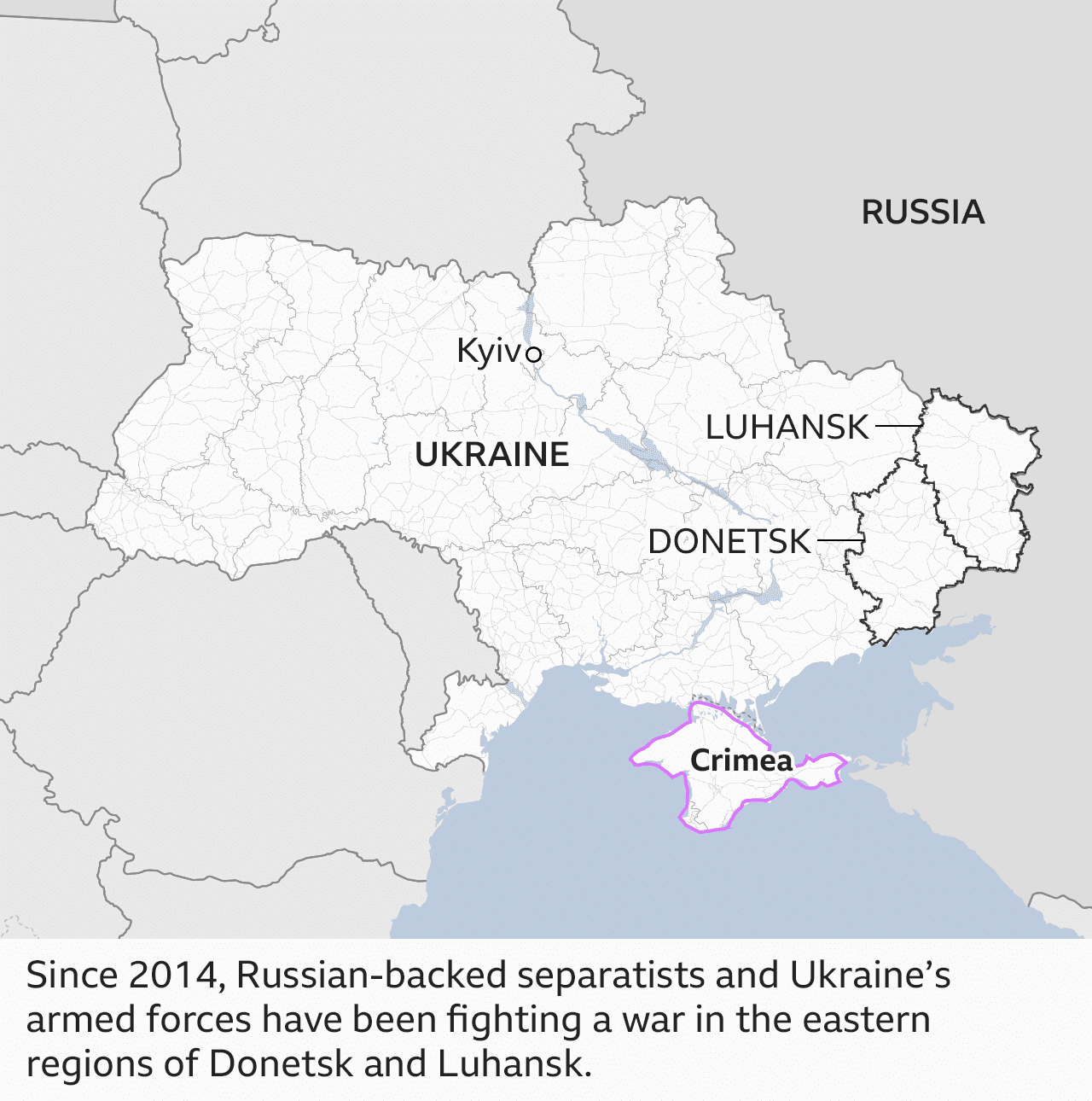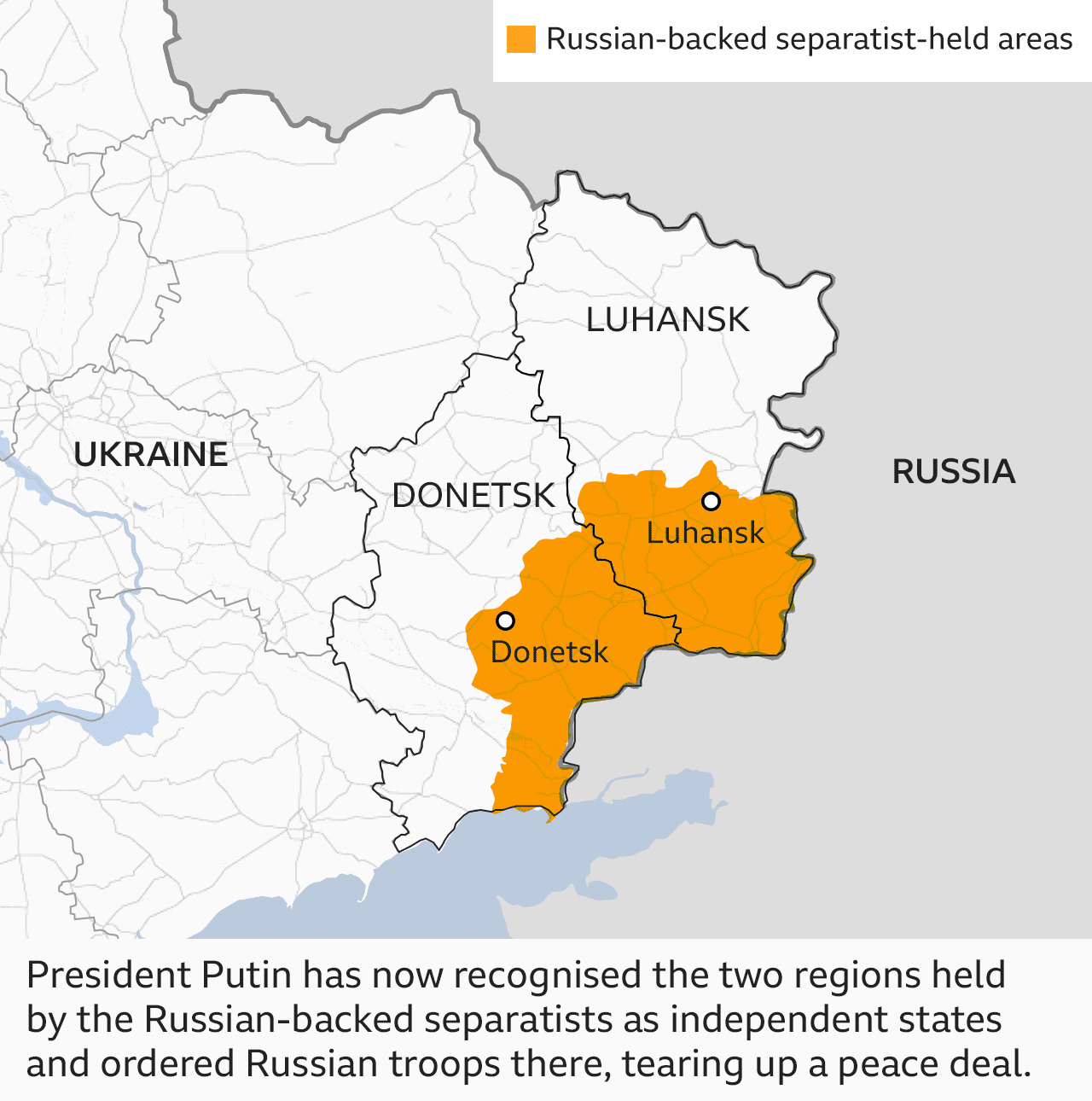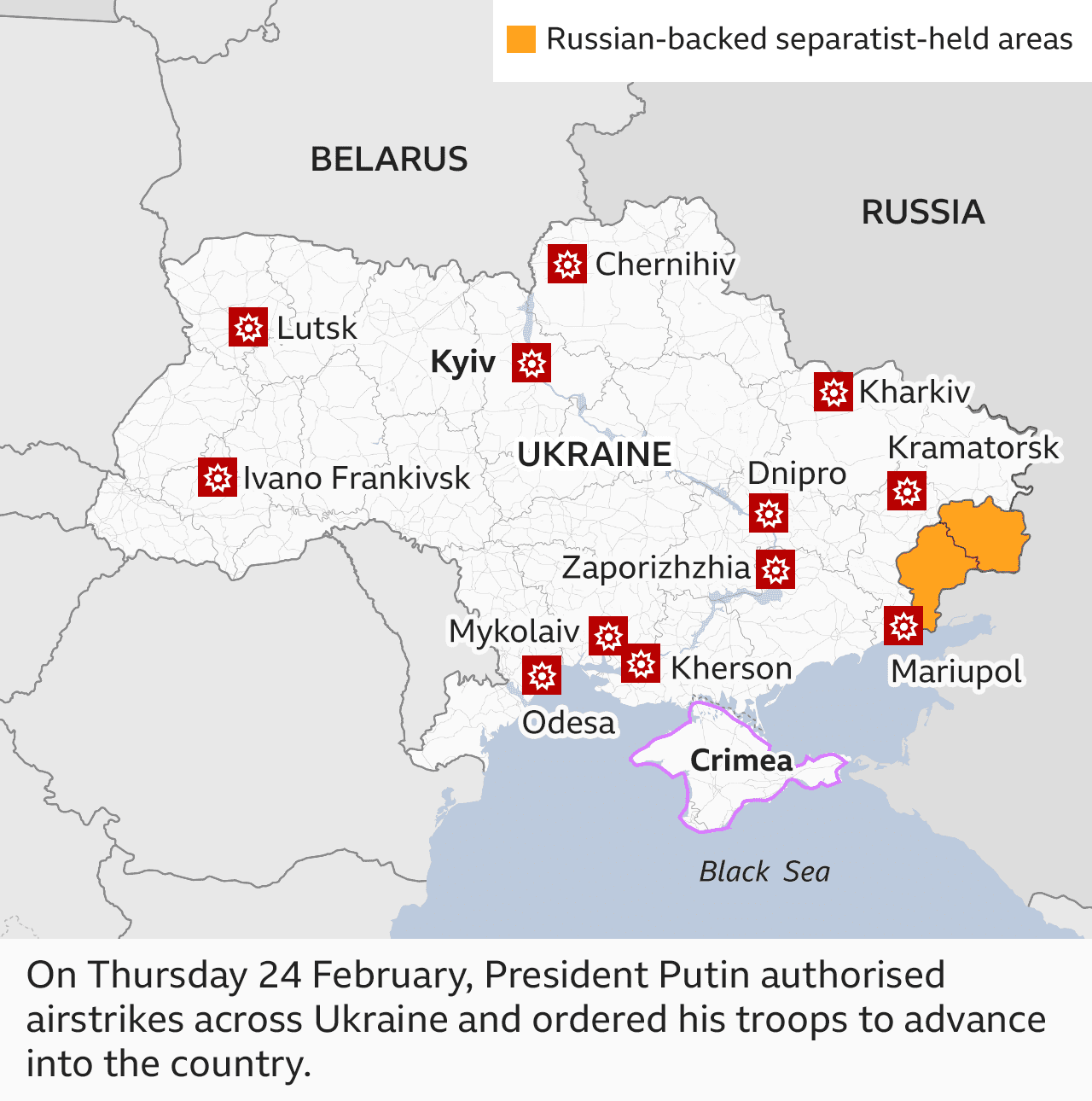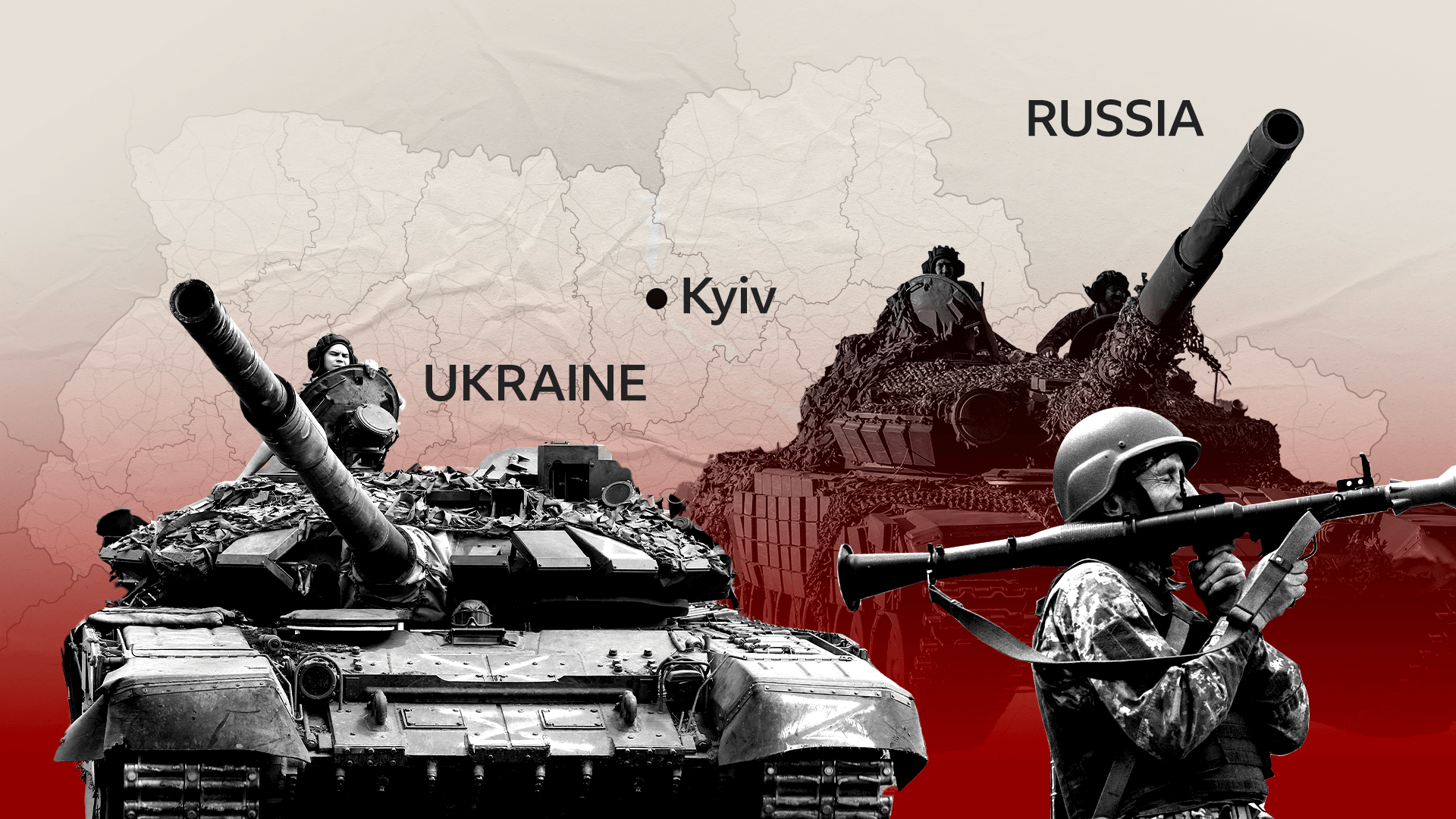Ukraine conflict: Kyiv braces for Russian assault
- Published
Watch: Missile strikes, tanks and buildings destroyed in Kyiv
The sound of gunfire has echoed through Ukraine's capital Kyiv as Russian tanks were filmed entering the city for the first time.
Ukraine's Ministry of Defence called on those living in the northern outskirts, where the tanks were seen, to make fire bombs "to neutralise the enemy".
The European Union has announced new sanctions to freeze Vladimir Putin's personal assets in Europe.
The Kremlin, meanwhile, says that Russia is ready for talks with Ukraine.
Spokesman Dmitry Peskov said talks would have to be about Ukraine declaring a "neutral status" - which would include "demilitarisation". Russia wants Ukraine to rule out ever joining Nato.
Ukraine's President Volodymyr Zelensky has repeatedly called for talks with Mr Putin, but has given no sign that he would agree to talks on the basis of "demilitarisation".
Overnight, Kyiv was hit by blasts, with at least one block of flats damaged and several civilians injured.
Russia has denied carrying out strikes.
An unnamed source at Russia's defence ministry also said a plane shot down over Kyiv was Ukrainian, Reuters news agency reports. Ukraine has said the jet was Russian.
As the second day of fighting began, Moscow - which is attacking from the east, north and south - appeared to have Kyiv firmly in its sights. Mayor Vitali Klitschko said "the enemy" was trying to put Kyiv "on its knees".
On Friday afternoon, Russia's defence ministry announced it had captured the Antonov airport, using 200 helicopters and a landing force in order to take the base to the north of Kyiv from Ukraine. Western intelligence officials warned earlier that Russia was building an "overwhelming force" to take control of the city.
Citizens in the northern Obolon district have been told to stay at home to avoid "active military operations" by city officials, Reuters adds. Obolon is the same area where it appeared tanks were filmed earlier in the day.
The Ministry of Defence had already appealed to the district's residents on its Facebook page to "inform us of troop movements, to make Molotov cocktails [firebombs] and neutralise the enemy".
Overnight, families took shelter in Kyiv's metro stations as aerial attacks struck the city, including the densely populated Pozniake area, injuring at least eight.
"Putin, we want to see you slaughtered like an animal," one Kyiv resident told the BBC's Nick Beake.
"How we can live through it in our time?" Oxana Gulenko asked Reuters as she cleaned up broken glass from one blast. "What should we think. Putin should be burnt in hell along with his whole family."
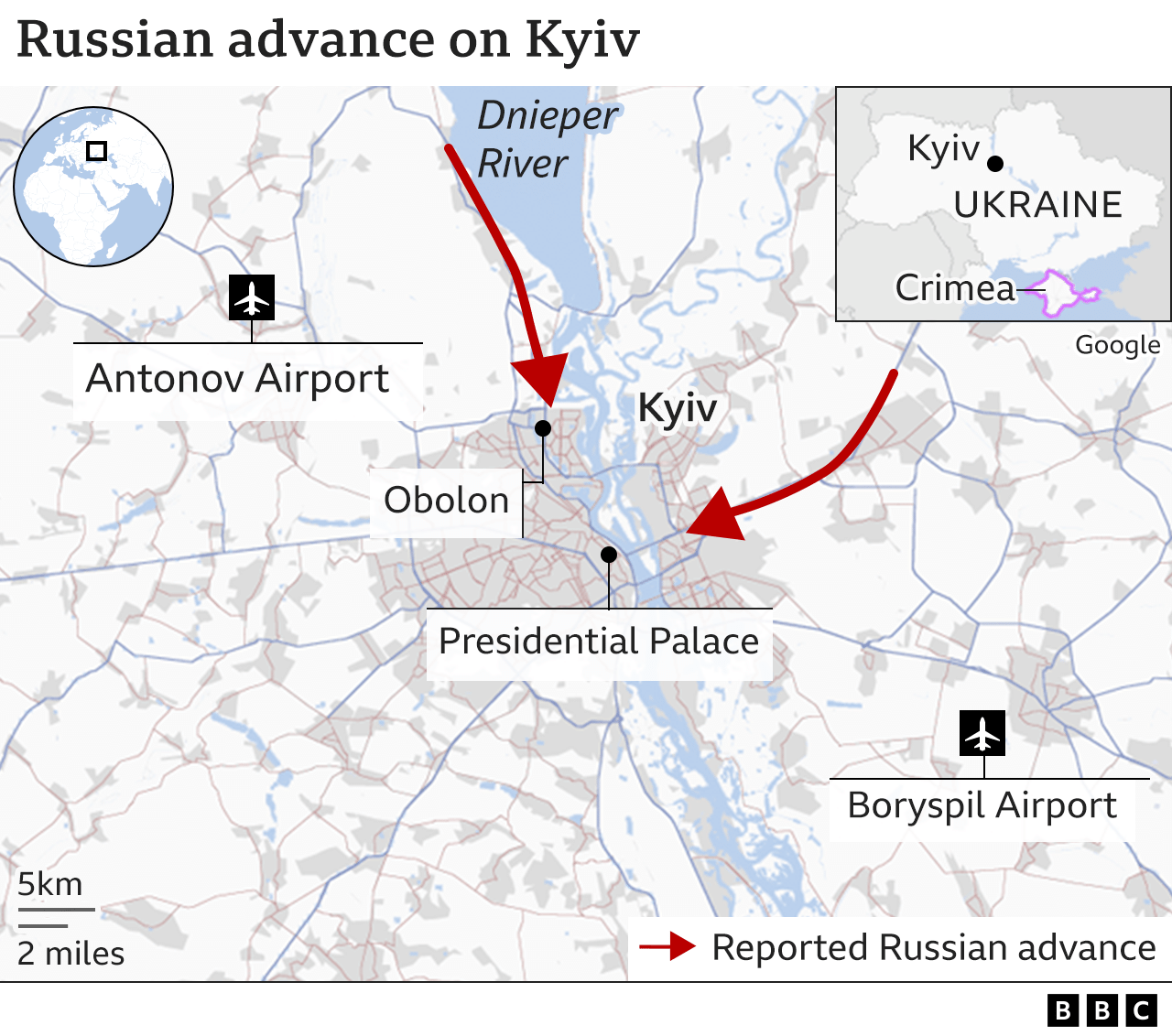
Earlier, Russian Foreign Minister Sergei Lavrov said no talks could be held until the Ukrainian military lays down its arms.
Mr Lavrov is also included in the EU's move to freeze personal assets - but it not clear whether he or President Putin have any significant assets in Europe.
Ukraine's President Volodymyr Zelensky had earlier said Russia was seeking to "destroy Ukraine politically by destroying the head of state".
"According to the information we have, the enemy has designated me as target number one. My family is target number two," he said.
President Zelensky has vowed to stay in Kyiv and to continue fighting the attacks across Ukraine - which is coming from the north, south and east - ordering the call-up of conscripts and reservists in all of Ukraine's regions. The country's defence minister urged anyone able to hold a weapon to join the effort to repel Russia.

Russia attacks Ukraine: More coverage
THE BASICS: Why is Putin invading Ukraine?
FROM KYIV: "There is no safe place any more"
FROM MOSCOW: Shock and support in Russian capital
IN MAPS: How Russia carried out the invasion

There have already been stories of immense bravery in the face of stark odds - including that of 13 border guards on a tiny island in the Black Sea who refused to surrender to a Russian warship and were massacred in a bombardment.
President Zelensky said they would be given posthumous war hero honours.
Thursday also saw fighting around the site of the former nuclear power plant in Chernobyl. Ukrainian presidential adviser Mykhaylo Podolyak said the nuclear site itself had been lost following a "fierce battle".
On Friday, Ukraine's nuclear agency said it was recording raised radiation levels in the area. A statement released by Russia's Ministry of Defence said levels were normal, adding an agreement had been reached "to ensure security of the power plant and sarcophagus of the Chernobyl Nuclear Plant".
Ukraine says at least 137 people - civilians and soldiers - have been killed. Russia has not admitted any deaths, whilst both sides claim to have inflicted heavy losses on the other.
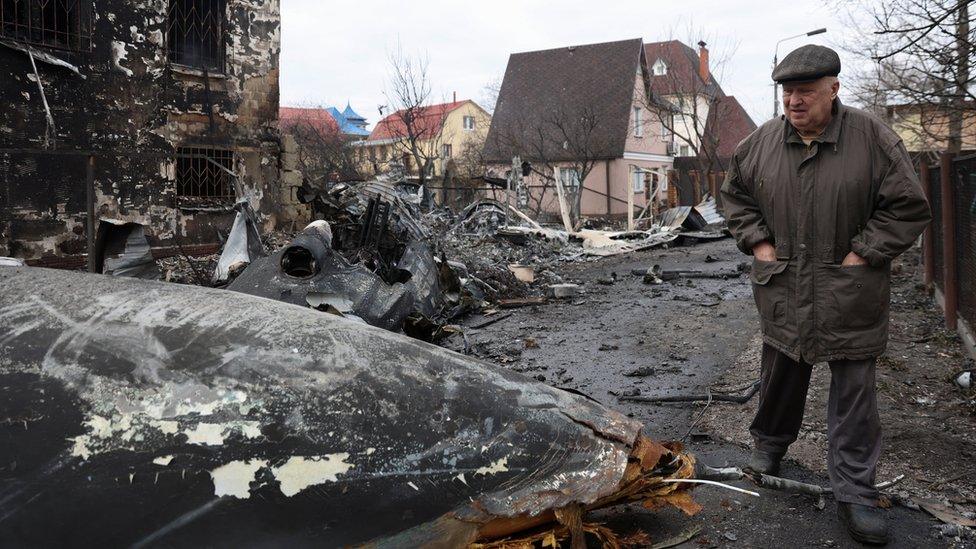
A man walks past the wreckage of a plane in Kyiv
President Vladimir Putin - who declared war in a dramatic televised address - has threatened any country attempting to interfere with "consequences you have never seen".
The UK, EU and other allies vowed to impose tough new sanctions to punish Moscow, but said they would not send in troops.
French President Emmanuel Macron held a telephone call with his Russian counterpart, in what was Mr Putin's first conversation with a Western leader in days, demanding an "immediate halt" to the offensive. The Kremlin, however, simply said the pair had a "serious and frank exchange of views".
Mr Zelensky, meanwhile, hit out at the European leaders' response.
"Like World War Two, you said never again, but here it is again and you're not doing enough to respond," he said.


Many said it couldn't, wouldn't, happen. Not in 2022.
For weeks, Western officials analysing the intelligence warned of President Putin's plan to take Kyiv.
For weeks, I've asked Ukrainians in Kyiv about it, and ran it past every foreign and defence minister, every Russia-watcher I met at last weekend's security conference in Munich.
It just didn't make sense. Just didn't add up.
And now, with every hour, Russian forces and fighting come ever closer to Kyiv.
A city where Ukrainians tell all of us to "call it Kyiv in Ukrainian, not Kiev in Russian", a city which feels so European, is now in Moscow's sights.
"A failure of imagination" is how former British intelligence chief Sir Alex Younger described it, adding "we thought history had changed in 1991" when the Soviet empire collapsed.



Are you in Ukraine? If it is safe to do so, tell us about your experiences of the recent events by emailing: haveyoursay@bbc.co.uk, external.
Please include a contact number if you are willing to speak to a BBC journalist. You can also get in touch in the following ways:
WhatsApp: +44 7756 165803, external
Tweet: @BBC_HaveYourSay, external
Or fill out the form below
Please read our terms & conditions and privacy policy
If you are reading this page and can't see the form you will need to visit the mobile version of the BBC website to submit your question or comment or you can email us at HaveYourSay@bbc.co.uk, external. Please include your name, age and location with any submission.
Related topics
- Published24 February 2022
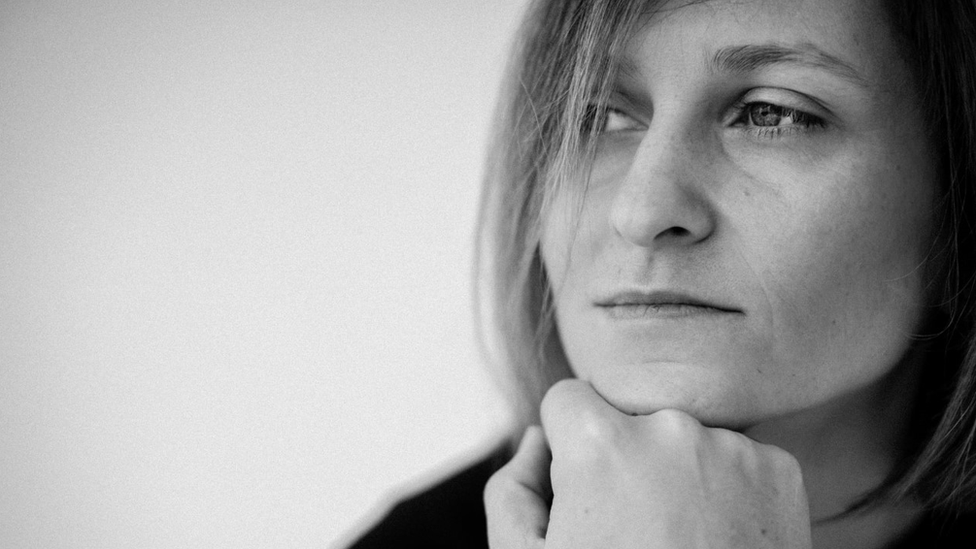
- Published24 February 2022
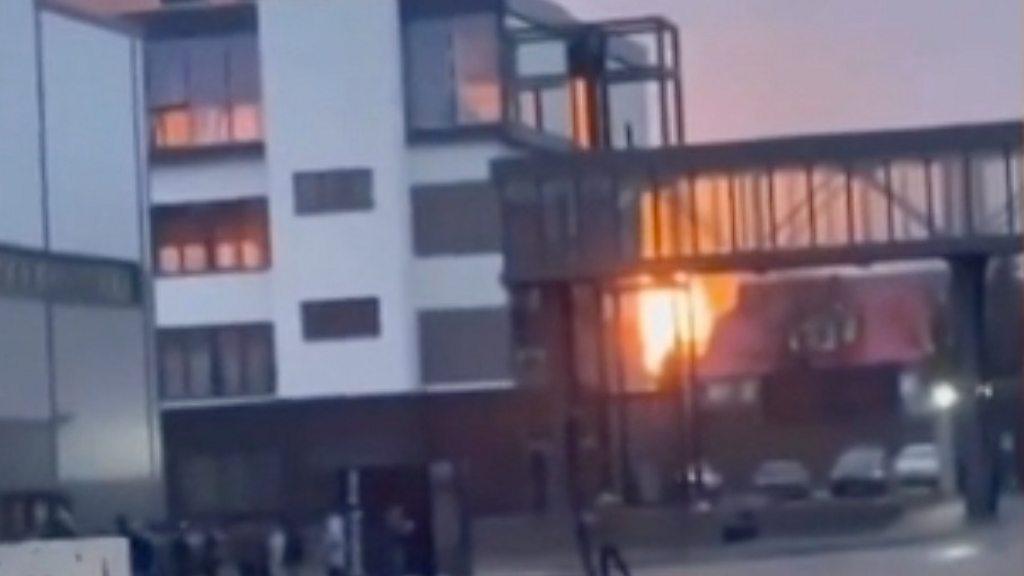
- Published24 February 2023
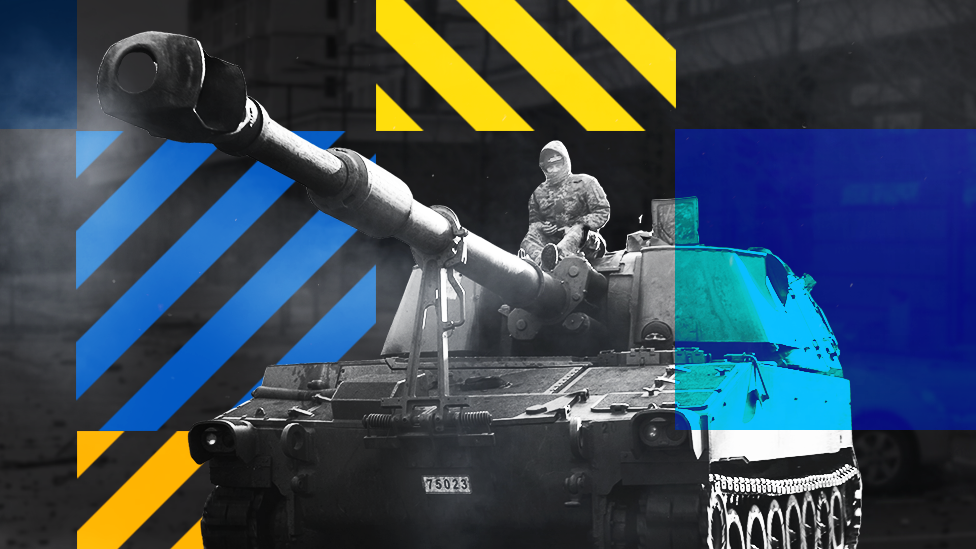
- Published24 February 2022
